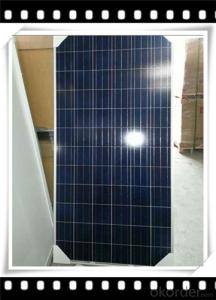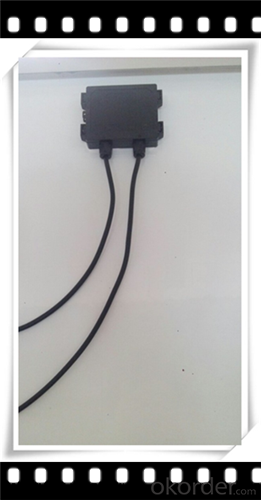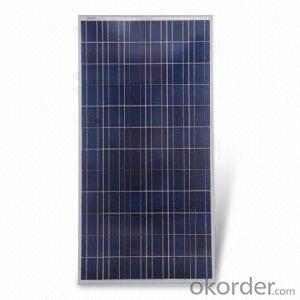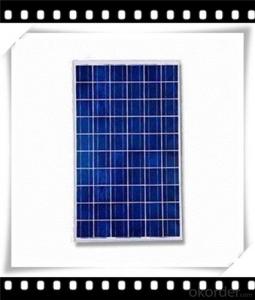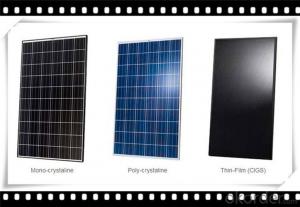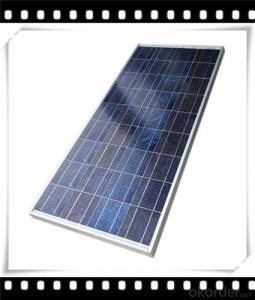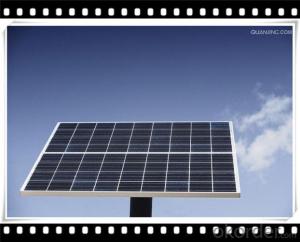2W Panasonic Poly Solar Panel - Small Solar Panel Manufacturer in China CNBM
- Loading Port:
- Qingdao
- Payment Terms:
- TT OR LC
- Min Order Qty:
- 10 set
- Supply Capability:
- 300000 set/month
OKorder Service Pledge
OKorder Financial Service
You Might Also Like
Polycrystalline Solar Modules
CNBM offers a range of small, medium and large polycrystalline solar modules, designed for a range of requirements.
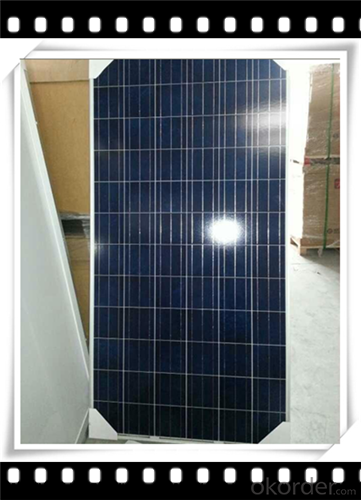
Specifications:
Tolerance | +/-3% |
Cell | Polycrystalline silicon solar cells (156 x 156mm) |
N0. of Cells | 60 (10 x 6) |
Dimension of Modules (mm) | 1650 x 990 x 40 |
Weight (kg) | 25.5 |
Limits:
Operating Temperature | -40~+85? |
Storage Temperature | -40~+85? |
Maximum System Voltage | 1000 VDC max. |
Hail Impact | Diameter of 28mm with impact speed |
Temperature and Coefficients:
NOCT | 48C+/-2? |
Voltage temperature coefficient (%/K) | -0.35 |
Current temperature coefficient (%/K) | 0.05 |
Power temperature coefficient (%/K) | -0.45 |
Characteristics:
Model: | SGM-200P | SGM-210P | SGM-220P |
Max-power voltage Vmp (V) | 29.2 | 29.4 | 29.41 |
Max-power current Imp (A) | 6.85 | 7.14 | 7.48 |
Open-circuit voltage Voc (V) | 36.5 | 36.69 | 36.9 |
Short-Circuit Current Isc (A) | 7.28 | 7.6 | 7.93 |
Max-power Pm(W) | 200 | 210 | 220 |
Model: | SGM-230P |
Max-power voltage Vmp (V) | 29.8 |
Max-power current Imp (A) | 7.72 |
Open-circuit voltage Voc (V) | 37.31 |
Short-Circuit Current Isc (A) | 8.19 |
Max-power Pm(W) | 230 |
STC: Irradiance 1000W/m2, module temperature 25?, AM-=1.5
Poly Crystalline Solar Panels Specifications Range
Maximum Power (Pm) | Dimension | Weight | Operating Voltage (Vmp) | Operating Current (Imp) | Open Circuit Voltage (Voc) | Short Circuit Current (Isc) |
0.45W | 140x80x10mm | 0.08kg | 3.3V | 150mA | 4.6V | 160mA |
1.0W | 162x140x10mm | 0.16kg | 7.5V | 150mA | 10.3V | 160mA |
4.5W | 269x251x23mm | 0.8kg | 16.5V | 0.27A | 20.5V | 0.3A |
10W | 420.1×268.9×22.6mm | 1.92kg | 17.5V | 0.58A | 20.5V | 0.6A |
20W | 425x502x50mm | 3.0kg | 16.8V | 1.19A | 21.0V | 1.29A |
30W | 593x502x22.6mm | 3.9kg | 16.8V | 1.78A | 21.0V | 1.94A |
40W | 655x537x50mm | 5.75kg | 17.3V | 2.31A | 22.1V | 2.54A |
50W | 839x537x50mm | 6.0kg | 17.5V | 2.9A | 21.8V | 3.17A |
65W | 1111x502x50mm | 7.2kg | 17.6V | 3.69A | 22.1V | 3.99A |
80W | 1204x537x50mm | 7.7kg | 17.6V | 4.55A | 22.1V | 4.8A |
- Q: Can solar panels be recycled? What about the manufacturing of these panels is it done in an Eco-friendly way?
- Most of the early panels were not very green. They were not very efficient and did not have a real long life span. The newer one are getting much better and there are several companies have cropped up that rebuild many different kinds of panels. Some of these newer panels have a life span in excess of 30 years and are much easier to maintain. The biggest problem with solar systems is that they are not kept clean and loose efficiency. If interested in setting up a system for your self, Please be very careful who you have do the work and what system you buy. There are many companies out there that are just trying to make a quick buck at your expense.
- Q: What is the purpose of solar panels?
- The purpose of solar panels is to convert sunlight into usable electricity, providing a clean and renewable energy source for various applications such as powering homes, buildings, and even vehicles, while reducing dependence on fossil fuels and mitigating environmental impact.
- Q: Can solar panels be used in areas with high levels of dust or sandstorms?
- Yes, solar panels can be used in areas with high levels of dust or sandstorms. However, frequent and heavy exposure to dust or sand can reduce their efficiency over time. Regular cleaning and maintenance are necessary to ensure optimal performance in such areas. Additionally, advanced solar panel designs and coatings are being developed to mitigate the impact of dust and sand accumulation, making them more suitable for use in these challenging environments.
- Q: i am wanting to build a small tiny house running 3-4 2 volt 5 watt light bulbs for a lighting source and using a Koolatron Fun Kool 26 Quart 2V Portable Mini Fridge This cooler consumes 4.5 amps at 2 volts. The conversion is: 4.5 amps (X) times 2 volts (=) equals 54 watts. and i want a solar system that will have back up for 2 days with the lights on for probly 5-6 hours a day so theirs no room for error
- you silly ! with Solar there is always room for error . you have to build it in to your numbers . solar is full of errors . So you should plan on producing at 3 times what you expect you will need . then you have enough .
- Q: I am interested in solar energy, but am not sure how eficiant it would be in the northwest? Any comments would be apriciated.
- If you have southern exposure . Go for it.
- Q: Around this time here in Georgia we will begin to get some big storms with high winds. I have a solar panel on a mount that isn't all that sturdy and could be knocked over with any winds pretty much above 5mph. I can't put anything in the ground to do this. I used to have it mounted to the roof of a playground for the most sunlight, but because of the angle of the sun and the tree leaves, I have to have it on a quot;portablemount so I can move it throughout the day, and I can tell you one thing is certain, and that's that it isn't the most sturdy thing ever. I'll have it a little better next weekend but it'll still be able to easily blow in the wind. Should I just hang the panel along the wall during a storm then reconnect it to its base once it's over?I'm pretty good with wood, so any wood creations to help out with the thing would greatly help. Just please keep it on a low budget.
- Solar panels are a costly and significant investment. Therefore, protecting them from harm should be a top priority. Unfortunately, moisture and water are common ways for solar panels to become damaged or broken. Safekeeping solar panels from both of these threats is a simple, inexpensive procedure, and doing so might save the solar panel owner a bundle if carried out correctly Instructions : Set a thick strip of silicone between each cell when putting the solar panel together, in order to prevent moisture seepage. 2: Use Plexiglas instead of glass as the face of your solar panel. Plexiglas is less liable to break and therefore safe from hailstorms or accidents. 3: Glue adhesive silicone to each side of your solar panel(s), adding additional sealant and protection from water to your commodity. :)
- Q: Can solar panels be installed on bridges or highways?
- Yes, solar panels can be installed on bridges or highways. This is known as solar roadways or solar bridges. These panels can generate electricity by harnessing sunlight and can be integrated into the surface of bridges or highways. However, the feasibility and practicality of such installations may vary depending on factors like structural considerations, cost, maintenance, and local regulations.
- Q: Hey was looking at a 5 watt 2 volt solar panel and was wondering if it'd be enough to power a regular light bulb. Also need to power a 5volt 6.5 amp pump for at most a minute at a time. So basically if I had this panel would I be able to plug a lamp into it and have it light for 5+ hours at a time with the possibility of running the pump? If not what size panel would I need?
- The specifications you give say the solar panel produces 5 watts at 2 volts (DC) so that isn't enough voltage to power an ordinary (20-volt) light bulb. You could get 0 of these panels and connect them in series so they put out a total of 20 volts and the total power available would be 50 watts. The panels would light the bulb that way, provided the bulb isn't over 50 watts and you can afford the panels. A panel does provide enough power for a 2-volt car light bulb less than 5 watts. However, the maximum current you can get from these panels is .25 amperes (5 watts divided by 2 volts = .25 A.) This isn't enough power to run your pump which takes 6.5 amperes - at 20 volts, that would be 780 watts. Another thing to check is the pump motor; many electric motors are designed to run on AC only and will be damaged if you try to run DC through them. Remember solar panels produce DC so the raw output from a panel will not work on an AC motor.
- Q: Can solar panels be used to power a satellite?
- Yes, solar panels can be used to power a satellite. Solar panels are commonly used in satellites to convert sunlight into electricity, which is then stored in batteries for use during periods when the satellite is not in direct sunlight. The efficiency and reliability of solar panels make them an ideal choice for powering satellites in space.
- Q: What are the different types of solar panels?
- There are three main types of solar panels: monocrystalline, polycrystalline, and thin-film. Monocrystalline panels are made from a single crystal structure, offering high efficiency but also higher costs. Polycrystalline panels are made from multiple crystal structures, slightly less efficient but more cost-effective. Thin-film panels use a layer of semiconductor material, providing the lowest efficiency but the ability to be flexible and lightweight.
Send your message to us
2W Panasonic Poly Solar Panel - Small Solar Panel Manufacturer in China CNBM
- Loading Port:
- Qingdao
- Payment Terms:
- TT OR LC
- Min Order Qty:
- 10 set
- Supply Capability:
- 300000 set/month
OKorder Service Pledge
OKorder Financial Service
Similar products
Hot products
Hot Searches
Related keywords
